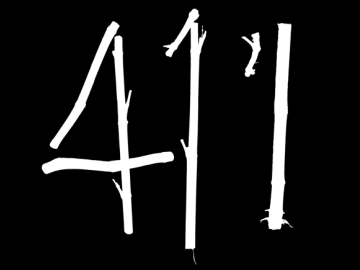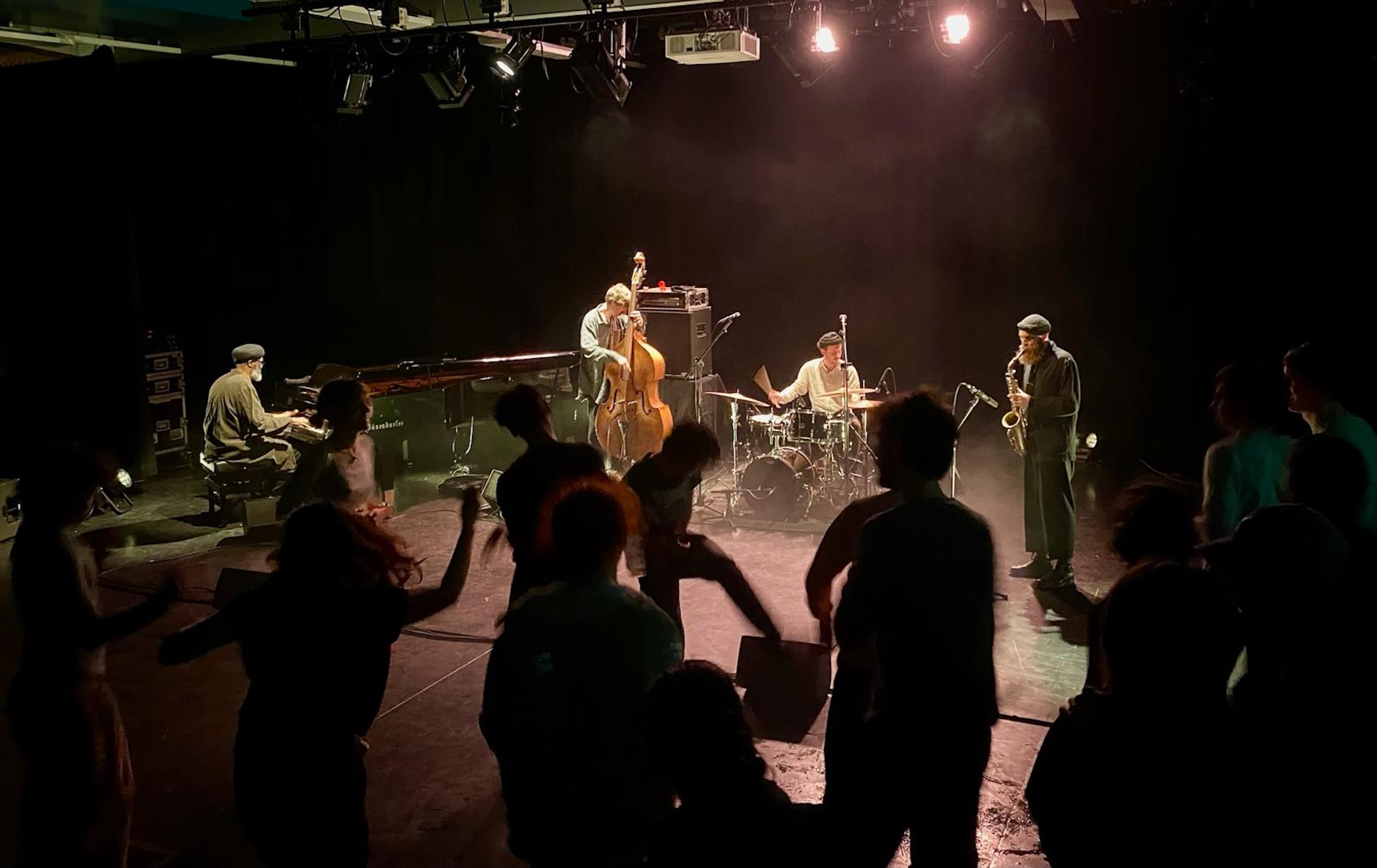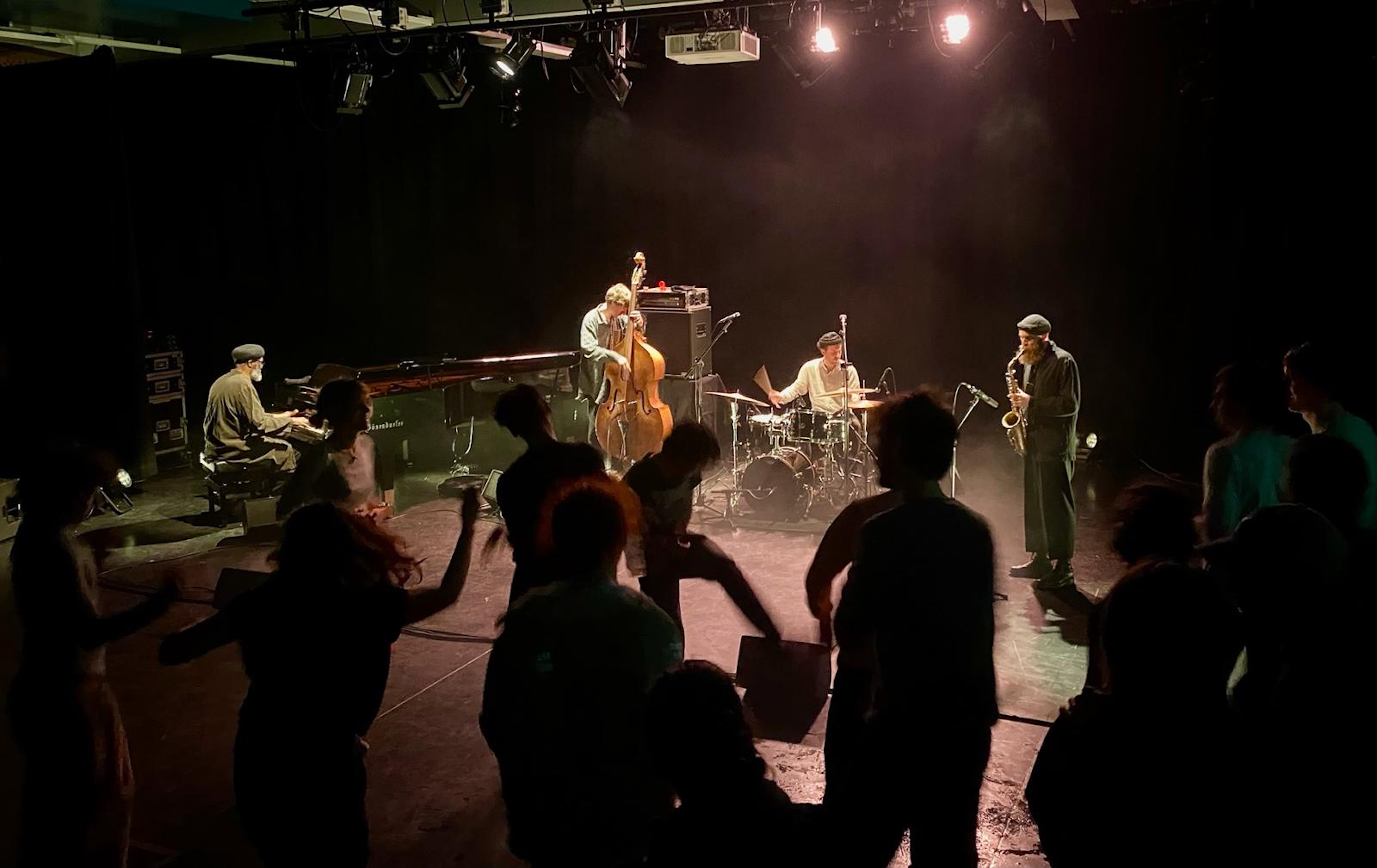ABOUT
FourOneOne is proud to present the UK, Sweden, and France-based أحمد [Ahmed] for a three-day residency in New York, at ShapeShifter, on February 19, 20, and 21, 2026. Tickets are on sale now.
أحمد [Ahmed] is a jazz quartet conceptually grounded in the life of Ahmed Abdul-Malik, the visionary 20th-century New York City bassist, oudist, composer, educator and philosopher. While their approach does include playing compositions written by Abdul-Malik, أحمد [Ahmed] is no repertory band. The group—pianist Pat Thomas and saxophonist Seymour Wright, both from the UK, Swedish double bassist Joel Grip and French drummer Antonin Gerbal—consider themselves improvisers first, using Abdul-Malik’s thematic material as jumping off points for radical extrapolations. Together they explore, in Wright’s words, the “aggregate awkward wealth” of Ahmed’s traces, including his recordings, teachings, writings, ethics, and practices of experimentation.
As evidenced by albums like Giant Beauty, the 5-CD concert recording that won them WIRE album of the year in 2024, أحمد [Ahmed] is very much a live act. The intensity and physicality of their sets characterizes a sound that is completely their own. Their performances frequently feature the relentless, high energy repetition of short phrases that change almost imperceptibly over time, creating vast sonic matrices out of minimal musical material. There are traces of Roscoe Mitchell’s Nonaah here, and influences of European “free improvisation,” but also the intervallic invention of Monk (a 2-CD collection of Monk tunes is forthcoming), and the irrepressible dance of the calypso of Thomas’ and Abdul-Malik’s shared Caribbean roots. Each member of the band has their own relationship to their namesakes’ music. Wright and Thomas discussed Abdul-Malik for years before the founding of the group. Grip absorbed his bass playing "unconsciously" as a teenager via classic Monk quartet records. An impressionable young Gerbal marvelled at the rhythm section of Abdul-Malik and drummer Roy Haynes on those same albums.
Emerging from the bebop era of the 1940s, Ahmed Abdul-Malik developed a vital, forward-looking body of music fusing Arabic, East African, and Caribbean music with then-current developments in American jazz. Despite his presence as a notable sideman on records by Thelonius Monk, Art Blakey, Randy Weston, and John Coltrane, and influence on subsequent generations of jazz artists’ engagement with traditions from around the globe, Abdul-Malik’s visionary work remains underrecognized. Through their own improvisatory practices, and inspired by him, أحمد [Ahmed] inhabit, question, and evolve the transatlantic resonances between his time and place and theirs, and bring forth a physical, rooted, ecstatic music.
Considering their FourOneOne residency’s place in أحمد [Ahmed]’s ongoing conversation with Abdul-Malik’s music and alternative histories of American jazz, Wright writes:
The idea of a residency, of playing night-after-night, in the same space, in the same city, re-imagining resources, re-visiting ideas, with (potentially) the same, returning, regular, or evolving audience is an important idea to [Ahmed]. It’s something we’ve been fortunate to do several times previously in London (four consecutive nights) and Stockholm (five consecutive nights), and Knoxville (two nights back-to-back). To do this in New York is special, given that our group formed in 2014, experimentally and in humility, with excavating, exploring, imagining and re-imagining of Ahmed Abdul-Malik’s open, radical musical ideas, philosophy, and work specifically in mind. A Brooklynite, ‘the beginning of a wide vision was perhaps almost forced’ on bassist, oudist, composer, collaborator, educator, philosopher Abdul-Malik, by his early environment. Born in Brooklyn, N.Y. on Jan 30, 1927, he grew up on Atlantic Ave., where “there were 10 different nationalities just in the neighbourhood. Your ears just had to open up.”
In March 2025, on the afternoon of our first visit to New York for a single Roulette concert, we walked from the venue the length of Atlantic Avenue in search of the address we had read to be Abdul-Malik’s family home. The building where he grew up is no longer there—it’s now a car mechanic’s workshop. But the inclusive, opening-up synthesis of ideas, views, cultures, and approaches together in one shared environment feels important still.
“If you could get out of economic problems,” Ahmed Abdul-Malik told Bill Coss in a 1963 Down Beat interview, “You could find the time, the energy to create. You have to have some peace of mind to create. The lack of this has brought about a serious problem. As the environment has changed a great deal in the last 10 years, many musicians have begun to believe that they will not be accepted if they venture. They are wrong to let that stop them, but I can understand that because there really is no place for them to show development."
“Very few record companies will allow you the opportunity, and no clubs are available where you can work and develop. Clubs used to allow you that – and time to build an audience. How can they expect jazz to develop if they only book established groups, or only give experimenting musicians an occasional two-week booking?"¹
Well, the ideas Abdul-Malik raises here feel important, still, also. Thoughts and problems of time, resources and opportunities, limiting and limited creative venture, exploration and learning, are all deeply relevant now. In 2025, a three-night booking to explore, improvise, imagine and re-imagine, in situ, in Brooklyn, feels like a remarkable and unique opportunity in which to work, develop and share. It will be an opportunity and space for us to reflect on, and look deeply into, all of these ideas, as we make something new, with you.
—Seymour Wright, London, 2025
¹The Philosophy of Ahmed Abdul-Malik, Bill Coss, Downbeat (Vol. 30, No. 15) p14, 1963.
Travel support for this program was provided by the Robert D. Bielecki Foundation.


